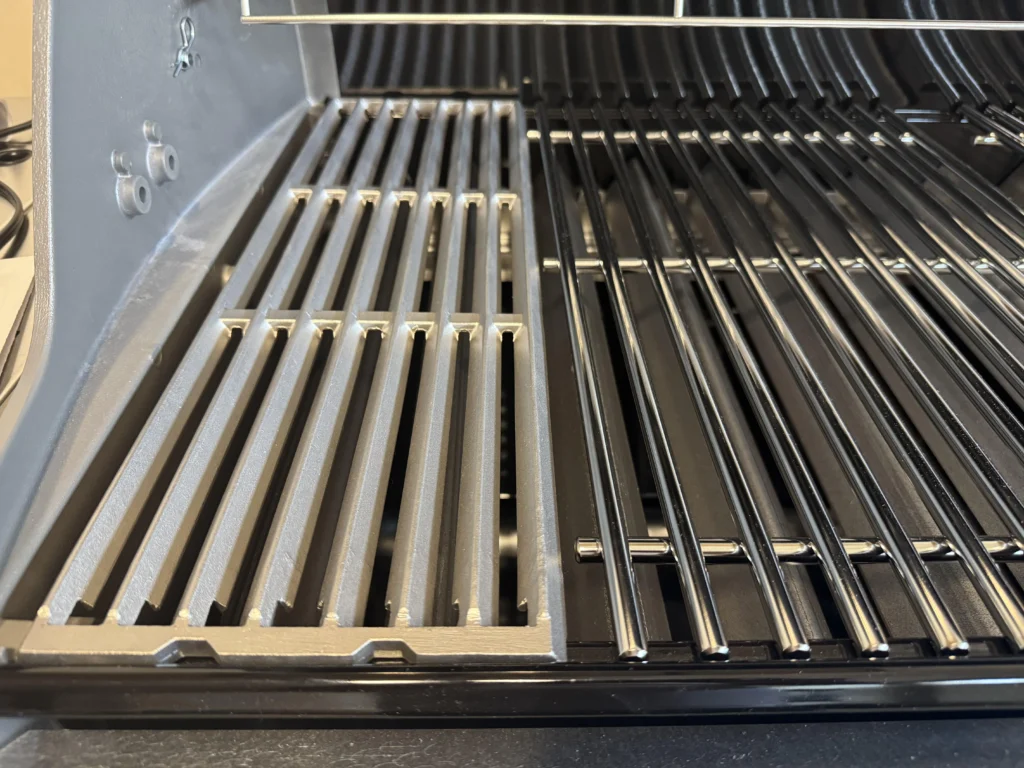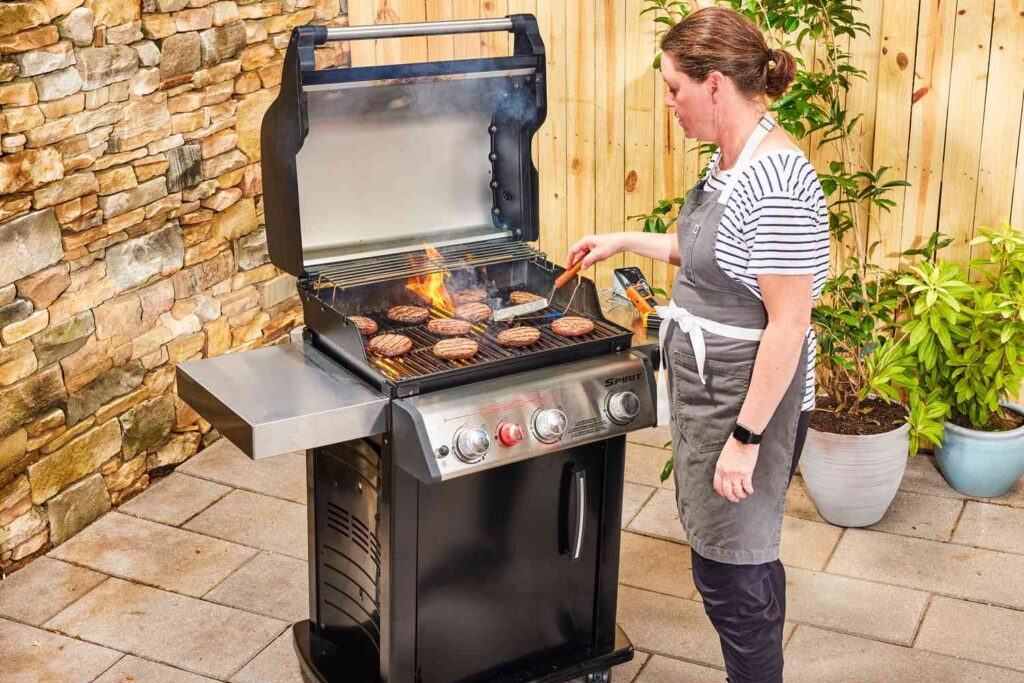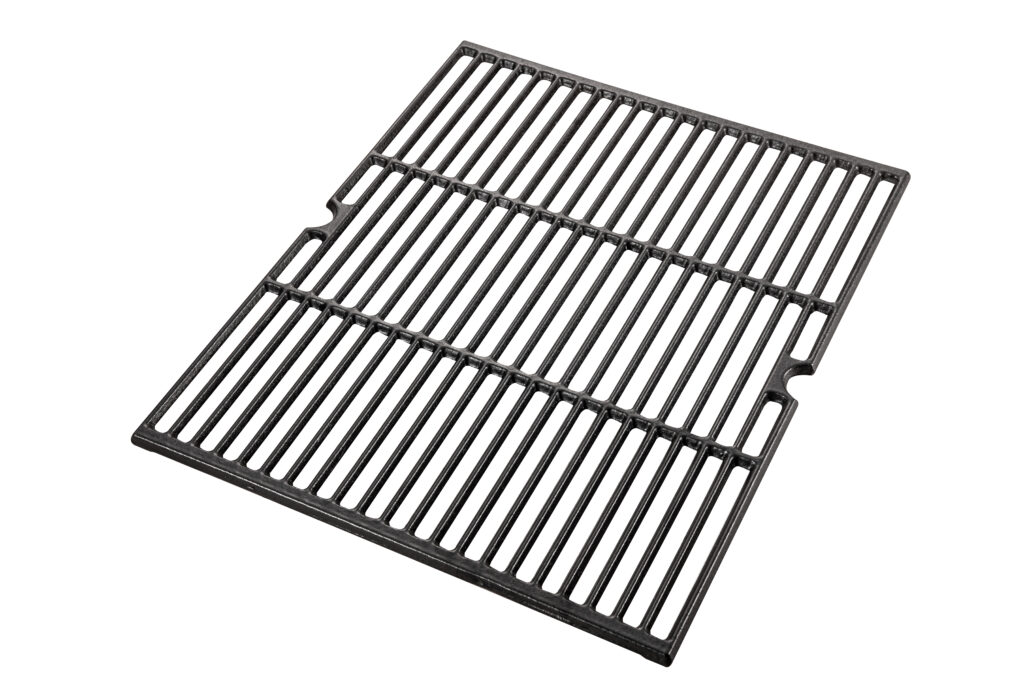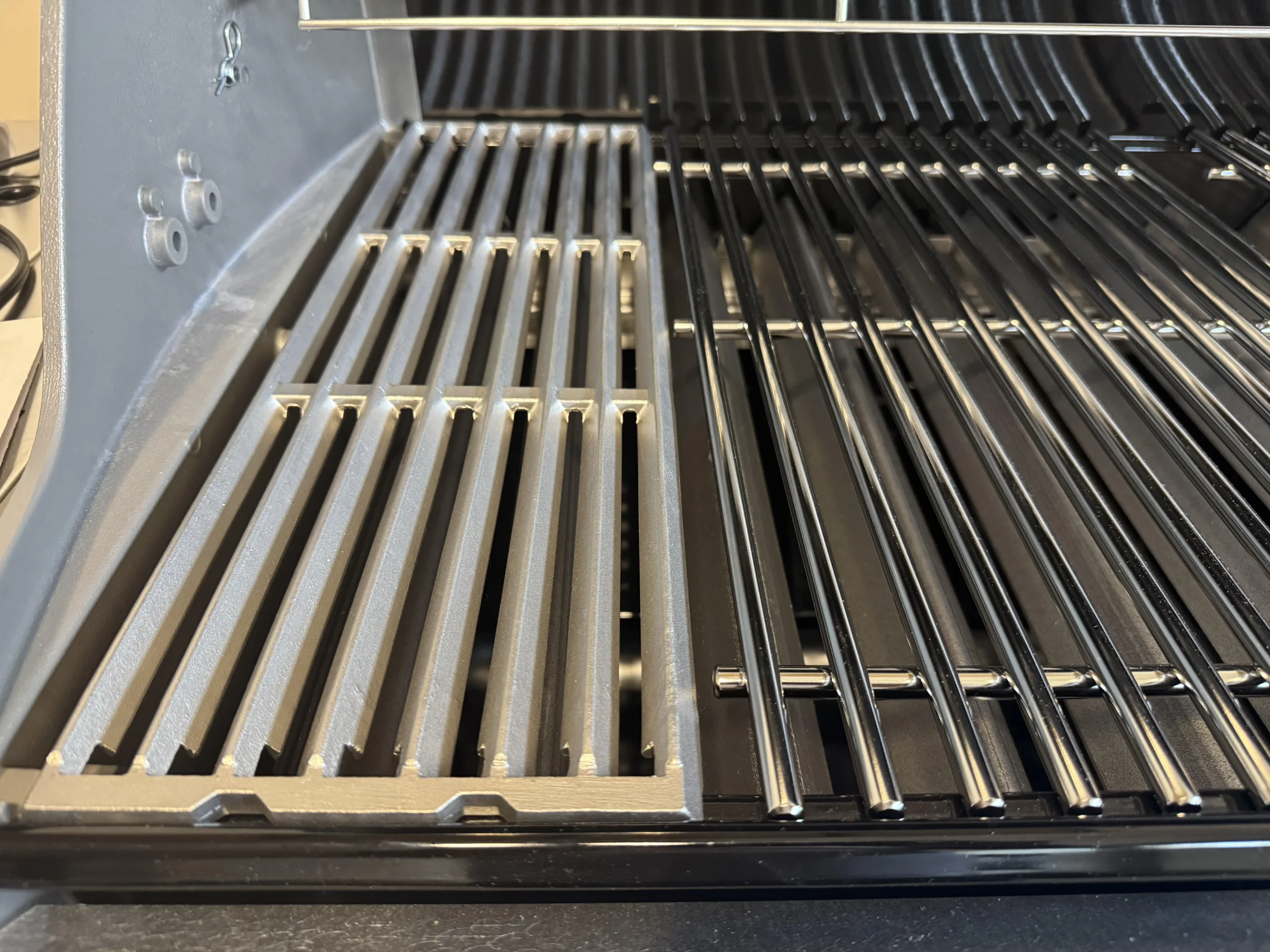The sound of meat hitting a hot grate often tells you how your cooking session will go. Many home cooks depend on this first moment. Some want fast heat. Some want deep marks on steak. Some want easy cleanup after dinner. These choices often lead to one simple question. Should you use cast iron or stainless steel grill grates? Both materials shape how your food cooks and tastes. They also shape how much work you must do to keep your grill in good shape. Many grill owners think both look similar. Yet both behave in different ways when heat rises and food touches metal. This creates a lot of confusion for new grill buyers.
Cast iron offers stronger heat retention and deeper sear marks. Stainless steel provides faster heating and easier cleaning. Both types work well for BBQ cooking. The better choice depends on what you cook, how you cook, and how much time you spend on grill care. This simple answer hides many small details. Each detail matters for cooking results. That is why this topic stays active in grill forums and search engines.
Many readers want more than a short answer. They want to know how each grate reacts to heat. They want to know which lasts longer. They want to know which is easier to clean. These questions build a full picture. This article guides you through each one in simple terms. You will learn what matters in real use, not just in theory.
What Are the Key Differences Between Cast Iron and Stainless Steel Grates?

Most grill owners begin with this question. Both materials look strong. Both can sit above high flames. Yet they feel different when touched. They also behave differently during long cooking. Many stores sell both types. This creates more confusion for first-time buyers. A clear comparison helps you see where both grates stand in normal cooking situations.
Cast iron is heavier, stores more heat, and produces stronger marks on food. Stainless steel heats faster, resists rust better, and needs less work to keep clean. This simple comparison shows the core difference. Cast iron loves steady heat. Stainless steel loves fast heat cycles. These traits shape the cooking style of each grate.
Material Traits Table
| Feature | Cast Iron | Stainless Steel |
|---|---|---|
| Heat retention | High | Medium |
| Heating speed | Slow | Fast |
| Maintenance | Needs oil | Low effort |
| Rust risk | High | Low |
| Weight | Heavy | Light |
Cooking Impact
The way both materials work has a direct effect on food. Cast iron stays hot for a long period. This helps when cooking thick meat. Stainless steel responds fast to flame changes. This helps when cooking many types of food that need lighter heat. These traits also help you choose based on your cooking habits.
Real Use Cases
Some cooks love slow sessions with steak or pork. Others enjoy cooking large batches for groups. Some want simple cleaning. Some want flavor memory. All these factors make the decision clearer. Cast iron fits cooks who want heat and flavor strength. Stainless steel fits cooks who want speed and convenience.
Which Grill Grate Material Heats Faster for BBQ Cooking?

Many cooks think high heat solves all cooking problems. They want hot grates for sear marks. They want fast grill response when turning knobs. Heating speed shapes how simple or hard the cooking feels. This makes heating speed one of the first things shoppers test in a store or in online reviews.
Stainless steel heats faster because it has less mass and less density. Cast iron heats slowly because it stores more heat within the metal. This difference changes how your grill responds to sudden changes. Stainless steel shines in fast cooking. Cast iron shines in stable cooking.
Heating Speed Table
| Measure | Cast Iron | Stainless Steel |
|---|---|---|
| Time to reach searing heat | Longer | Shorter |
| Response to knob changes | Slow | Fast |
| Best for | Thick cuts | Mixed foods |
Why Fast Heat Matters
Fast heat helps when you cook small items like vegetables, shrimp, or wings. These foods do not need deep heat. They need quick adjustment. Stainless steel lets you shift heat levels with ease. This is helpful when cooking many items at the same time.
Why Slow Heat Helps
Cast iron builds deep heat. It stays hot even when cold food hits the surface. This stops temperature drops. This helps steak, burgers, and pork chops. Many cooks want this steady heat. It gives better browning and stronger crust.
Practical Advice
Choose stainless steel when you cook for many people. Choose cast iron when you cook thick cuts and want a deep, strong crust. Heating speed connects directly to cooking style. This makes the choice easier.
Which Grates Produce Better Sear Marks on Steak?

Sear marks show how heat meets meat. Many cooks judge a grill by how well it creates these marks. Good marks show strong heat. They show good contact between food and metal. Many buyers choose grates based only on this feature.
Cast iron produces deeper and darker sear marks. Stainless steel produces lighter marks because it cools faster when meat touches it. This is why steak lovers often choose cast iron. The metal holds more heat. It does not drop temperature fast. This helps the meat brown in a strong way.
Sear Quality Table
| Measure | Cast Iron | Stainless Steel |
|---|---|---|
| Sear depth | High | Medium |
| Heat loss on contact | Low | High |
| Best for | Thick steak | Light meats |
Why Cast Iron Wins
Cast iron does not react fast to cold surfaces. This makes it perfect for steak. It pushes heat into the meat in a steady way. This creates a crust. The crust holds juices. Many cooks feel this creates a better bite.
Why Stainless Steel Still Works
Stainless steel can make marks. It just needs higher heat. Many grills use thin stainless rods. These rods cool fast. Yet they work well for chicken and fish. These meats do not need a heavy crust. They need gentle browning.
For Ideal Sear
Use cast iron if sear marks matter. Heat both sides of the grate long enough. Do not move the meat too early. Let contact work. Cast iron rewards patience. Stainless steel rewards speed.
Do Cast Iron Grates Last Longer Than Stainless Steel Ones?
Longevity shapes long-term cost. Many grill owners want their grates to last many seasons. They want strong metal that stays stable under heat. Many believe cast iron lasts forever. Many think stainless steel never rusts. Both ideas need clarity.
Cast iron lasts longer when it gets care. Stainless steel lasts longer when exposed to weather. The better material depends on the environment and how you store your grill. This gives a balanced view. Longevity is not a simple yes-or-no answer.
Longevity Table
| Condition | Cast Iron | Stainless Steel |
|---|---|---|
| With care | 20+ years | 10–15 years |
| With poor care | Rust fast | Discolor |
| Wet environment | Poor | Good |
Climate Effects
Moist areas cause cast iron to rust. Salt air accelerates rust. This makes stainless steel a better option for coastal homes. Dry regions support cast iron. It stays stable when stored in dry garages or sheds.
Owner Habits
People who enjoy gear care will enjoy cast iron. People who prefer simple routines will enjoy stainless steel. Longevity mirrors owner effort. This makes the choice personal.
Can Stainless Steel Grill Grates Rust Over Time?
Many think stainless steel never rusts. Many think the “stainless” name promises perfect surface forever. This causes misunderstandings. Knowing the truth helps avoid disappointment.
Stainless steel can rust when exposed to salt, moisture, and dirty grease for long periods. It resists rust better than cast iron. It does not eliminate rust risk entirely. This small detail helps set honest expectations.
Rust Risk Table
| Exposure | Cast Iron | Stainless Steel |
|---|---|---|
| Salt | Very high | Medium |
| Moisture | High | Low |
| Grease buildup | High | Medium |
How to Avoid Rust
Keep stainless steel dry. Clean off grease. Use grill covers. Rinse salt air when living near the ocean. These small steps prevent rust spots. Stainless steel stays smooth when treated with simple care.
Surface Shine
Stainless steel also loses shine over time. This is normal. Heat changes color. This does not reduce performance. Many owners accept this as a natural sign of use.
Which Grill Grate Performs Best for High-Heat Searing?
High heat shapes steak flavor. Many cooks want searing power. They want a good crust. They want to lock juices inside. This makes high-heat performance a key question.
Cast iron is best for high-heat searing because it stores heat and does not drop temperature fast. Stainless steel handles long high-heat sessions but does not store heat as deeply. This gives each metal a different strength.
High Heat Table
| Task | Cast Iron | Stainless Steel |
|---|---|---|
| Quick sear | Best | Good |
| Long sessions | Good | Best |
| Fast cycles | Medium | Best |
Practical Use
Cast iron works like a pan. It hits the meat with steady heat. This creates the crust. Stainless steel shines when you run the grill hot for long periods. It does not warp as easy. This suits outdoor parties and big groups.
Does Cast Iron Provide Better Flavor Than Stainless Steel?
Flavor comes from browning. Browning comes from heat. Heat meets the metal surface. This whole process leads to many flavor debates in the BBQ world.
Cast iron provides stronger flavor because it creates deeper browning and retains oil residue that forms a seasoning layer. Stainless steel provides clean flavor without flavor memory. This difference shapes the taste of food cooked often on the same grates.
Flavor Table
| Measure | Cast Iron | Stainless Steel |
|---|---|---|
| Flavor depth | High | Low |
| Oil absorption | Yes | No |
| Smoky aroma | Strong | Mild |
How Flavor Builds
Cast iron builds memory. Each cook adds a thin layer. This layer helps new food release easier. It also creates small taste notes. Stainless steel stays neutral. It does not absorb anything. This helps cooks who want pure flavor without residue.
Do Professional Grillers Prefer Cast Iron or Stainless Steel?
Professional cooks face different pressures. They cook fast. They cook for many people. They cook under time limits. This shapes their choice.
Chefs use both. Cast iron for searing. Stainless steel for speed and volume. The choice depends on the task, not on which metal is “better.” This balanced view reflects real kitchen life.
Professional Use Table
| Environment | Preferred Grate |
|---|---|
| Steakhouse | Cast Iron |
| Catering | Stainless Steel |
| Outdoor events | Stainless Steel |
| Home cooking | Either |
Why Both Matter
Chefs want tools that solve tasks. They do not lock themselves to one type. This approach also helps home cooks. Use what suits the meal. Both types work well when used with the right method.
Conclusion
Both cast iron and stainless steel grates work well for BBQ cooking. Each metal carries a set of strengths. Cast iron offers deeper sear marks, stable heat, and stronger flavor. Stainless steel gives faster heating, easier cleaning, and better rust resistance. The right choice depends on your cooking style, your climate, and how much time you spend on maintenance. Both materials can serve you for many seasons when handled well. A grill grate should feel like a tool, not a burden. Choose the one that matches how you cook, how often you cook, and how much work you want to do after each meal.

